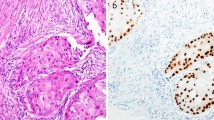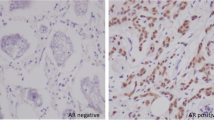Abstract
The aim of this study is to analyze the prognostic value of androgen receptor (AR) expression for patients with triple-negative breast cancer (TNBC). Clinical data of these patients were collected and analyzed, and immunohistochemical staining for AR was performed on tissue microarrays of operable breast cancer from 287 patients with TNBC, who were treated at Sun Yat-sen University Cancer Center from January 1995 to December 2008. AR expression was found in 25.8% of the cases with TNBC. TNBC patients with AR negative have a higher proportion of positive lymph node. A significant correlation was found between AR expression and disease-free survival (DFS) and overall survival (OS). Univariated analysis indicated that AR expression had a significant prognostic value in TNBC patients, whereas multivariate analysis indicated that AR was a significant independent prognostic factor of DFS (P = 0.032) in all patients. Our results suggested that AR was a favorable prognostic factor of DFS and OS in patients with TNBC. Therefore, TNBC may be further divided into two subtypes according to AR status.


Similar content being viewed by others
References
Dent R, et al. Triple-negative breast cancer: clinical features and patterns of recurrence. Clin Cancer Res. 2007;13:4429–34.
Carey LA, et al. The triple negative paradox: primary tumor chemosensitivity of breast cancer subtypes. Clin Cancer Res. 2007;13:2329–34.
Tischkowitz M, et al. Use of immunohistochemical markers can refine prognosis in triple negative breast cancer. BMC Cancer. 2007;7:134.
Bauer KR, et al. Descriptive analysis of estrogen receptor (ER)-negative, progesterone receptor (PR)-negative, and HER2-negative invasive breast cancer, the so-called triple-negative phenotype: a population-based study from the California cancer registry. Cancer. 2007;109:1721–8.
Hines SL, et al. Clinical outcomes after a diagnosis of brain metastases in patients with estrogen- and/or human epidermal growth factor receptor 2-positive versus triple-negative breast cancer. Ann Oncol. 2008;19(9):1561–5.
Lin Nu, et al. Sites of distant recurrence and clinical outcomes in patients with metastatic triple-negative breast cancer: high incidence of central nervous system metastases. Cancer. 2008;113(10):2638–45.
Nam BH, et al. Breast cancer subtypes and survival in patients with brain metastases. Br Cancer Res. 2008;10(1):R20.
Schneider BP, et al. Triple negative breast cancer: risk factors to potential targets. Clin Cancer Res. 2008;14(24):8010–8.
Brys M. Androgens and androgen receptor: do they play a role in breast cancer? Med Sci Monit. 2000;6:433–8.
Liao DJ, et al. Roles of androgens in the development, growth, and carcinogenesis of the mammary gland. J Steroid Biochem Mol Biol. 2002;20:175–89.
Hankinson SE, et al. Plasma sex steroid hormone levels and risk of breast cancer in postmenopausal women. J Natl Cancer Inst. 1998;90:1292–9.
Doane AS, et al. An estrogen receptor-negative breast cancer subset characterized by a hormonally regulated transcriptional program and response to androgen. Oncogene. 2006;25:3994–4008.
Agoff SN, et al. Androgen receptor expression in estrogen receptor-negative breast cancer. Immunohistochemical, clinical, and prognostic associations. Am J Clin Pathol. 2003;120:725–31.
Gonzalez-Angulo AM, et al. Androgen receptor levels and association with PIK3CA mutations and prognosis in breast cancer. Clin Cancer Res. 2009;15:2472–8.
Kononen J, et al. Tissue microarrays for highthroughput molecular profiling of tumor specimens. Nat Med. 1998;4:844–7.
Conflict of interest
All authors have no financial disclosures and conflicts of interest.
Author information
Authors and Affiliations
Corresponding author
Additional information
Shusen Wang contributed equally to this work.
Rights and permissions
About this article
Cite this article
He, J., Peng, R., Yuan, Z. et al. Prognostic value of androgen receptor expression in operable triple-negative breast cancer: a retrospective analysis based on a tissue microarray. Med Oncol 29, 406–410 (2012). https://doi.org/10.1007/s12032-011-9832-0
Received:
Accepted:
Published:
Issue Date:
DOI: https://doi.org/10.1007/s12032-011-9832-0




